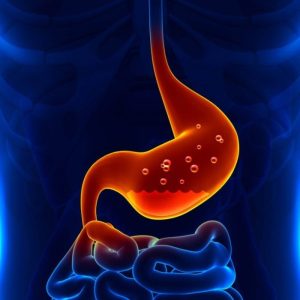
How to prevent acid reflux sets the stage for this enthralling narrative, offering readers a glimpse into a story that is rich in detail with entertaining interactive style and brimming with originality from the outset.
Are you tired of that burning sensation in your chest after a spicy meal? Well, buckle up because we’re about to dive into the world of acid reflux prevention, with a treasure trove of tips, remedies, and lifestyle changes to keep heartburn at bay.
Overview of Acid Reflux
Acid reflux, also known as gastroesophageal reflux disease (GERD), is a condition where stomach acid flows back up into the esophagus. This occurs when the lower esophageal sphincter, a ring of muscle between the esophagus and stomach, relaxes abnormally or weakens, allowing the acidic contents of the stomach to regurgitate into the esophagus.
Symptoms of Acid Reflux
- Heartburn: a burning sensation in the chest that may worsen after eating or lying down
- Regurgitation: sour or bitter-tasting acid backing up into the throat or mouth
- Dysphagia: difficulty swallowing
- Chronic cough
- Chest pain
Potential Complications of Untreated Acid Reflux
- Esophagitis: inflammation of the esophagus due to repeated exposure to stomach acid
- Barrett’s esophagus: a condition where the cells lining the esophagus change, increasing the risk of esophageal cancer
- Esophageal stricture: narrowing of the esophagus due to scarring from repeated acid exposure
- Respiratory problems: aspiration of stomach acid into the lungs can cause pneumonia or asthma
- Dental problems: erosion of tooth enamel due to acid exposure
Causes of Acid Reflux
Acid reflux can be triggered by various factors, ranging from dietary choices to underlying medical conditions. Understanding these causes can help in managing and preventing acid reflux.
Common Triggers
- Fatty or fried foods: These can relax the lower esophageal sphincter, allowing stomach acid to flow back up into the esophagus.
- Caffeine and alcohol: Both substances can increase stomach acid production, leading to irritation of the esophagus.
- Citrus fruits and tomatoes: These are acidic in nature and can aggravate acid reflux symptoms.
Lifestyle Factors
- Diet: Consuming large meals, spicy foods, or acidic foods can trigger acid reflux symptoms.
- Stress: High levels of stress can lead to increased stomach acid production, worsening acid reflux symptoms.
Medical Conditions
- Hiatal hernia: This condition occurs when the upper part of the stomach bulges through the diaphragm, allowing acid to escape into the esophagus.
- Obesity: Excess weight can put pressure on the stomach, causing acid to flow back up into the esophagus.
- Pregnancy: Hormonal changes and the pressure of the growing uterus can lead to acid reflux in pregnant women.
Prevention Strategies
To prevent acid reflux, it’s essential to make some dietary changes, adopt lifestyle modifications, and maintain a healthy weight.
Dietary Changes
- Avoid trigger foods and beverages that can worsen acid reflux, such as spicy foods, citrus fruits, caffeine, and alcohol.
- Eat smaller meals more frequently throughout the day to prevent overeating and reduce pressure on the stomach.
- Avoid lying down immediately after eating and try to stay upright for at least 2-3 hours to allow digestion to occur properly.
- Include more high-fiber foods like fruits, vegetables, and whole grains in your diet to promote better digestion and prevent acid reflux.
Lifestyle Modifications
- Avoid smoking and secondhand smoke, as they can weaken the lower esophageal sphincter, allowing stomach acid to flow back up into the esophagus.
- Manage stress through relaxation techniques like deep breathing, meditation, or yoga, as stress can exacerbate acid reflux symptoms.
- Elevate the head of your bed by 6-8 inches to prevent nighttime reflux and use pillows to support your upper body if needed.
Importance of Maintaining a Healthy Weight
- Excess weight, especially around the abdomen, can put pressure on the stomach and increase the risk of acid reflux.
- Losing weight through a combination of a healthy diet and regular exercise can help reduce acid reflux symptoms and improve overall health.
- Consult a healthcare provider for personalized advice on weight management strategies to prevent and manage acid reflux effectively.
Home Remedies for Acid Reflux
When it comes to managing acid reflux symptoms at home, there are several natural remedies that can help alleviate discomfort and promote digestive health. These remedies can be easily incorporated into your daily routine to provide relief from acid reflux.
Ginger Root
Ginger root is known for its anti-inflammatory properties, which can help reduce inflammation in the esophagus and stomach. You can consume ginger root by steeping it in hot water to make ginger tea or adding it to your meals for added flavor and digestive benefits.
Apple Cider Vinegar
Although it may seem counterintuitive, apple cider vinegar can actually help balance stomach acid levels and improve digestion. Mix a tablespoon of raw, unfiltered apple cider vinegar in a glass of water and drink it before meals to aid in preventing acid reflux symptoms.
Chamomile Tea
Chamomile tea is a soothing herbal remedy that can help relax the muscles in the digestive tract, reducing the likelihood of acid reflux. Drinking a cup of chamomile tea before bedtime can help calm the stomach and promote better digestion.
Licorice Root
Licorice root has been used for centuries to treat digestive issues, including acid reflux. It contains compounds that help protect the stomach lining and reduce inflammation. You can find licorice root supplements in health food stores or drink licorice root tea to experience its benefits.
Fennel Seeds
Fennel seeds are a natural remedy for indigestion and acid reflux. Chewing on a few fennel seeds after meals can help reduce bloating, gas, and stomach discomfort. Fennel seeds can also be steeped in hot water to make a soothing tea that aids digestion.
Aloe Vera Juice
Aloe vera juice is known for its cooling and soothing properties, making it a popular remedy for acid reflux. Drinking a small amount of aloe vera juice before meals can help reduce acid reflux symptoms and promote healing of the esophagus.These home remedies offer natural and effective ways to manage acid reflux symptoms without the need for prescription medications. Incorporating these remedies into your daily routine can help alleviate discomfort and promote better digestive health.
Medical Treatments for Acid Reflux
When lifestyle changes and home remedies are not enough to manage acid reflux, medical treatments may be necessary. There are various options available for treating acid reflux, including medications and surgical procedures. It is important to consult with a healthcare professional to determine the most appropriate treatment plan based on individual needs and severity of the condition.
Medications for Acid Reflux
Medications are commonly prescribed to help alleviate the symptoms of acid reflux and reduce the amount of stomach acid produced. Some of the most commonly prescribed medications for acid reflux include:
- Proton pump inhibitors (PPIs) such as omeprazole, esomeprazole, and lansoprazole, which help reduce acid production in the stomach.
- H2 receptor antagonists like ranitidine and famotidine, which work by blocking histamine receptors to reduce acid production.
- Antacids, such as Tums or Rolaids, which help neutralize stomach acid and provide quick relief from heartburn.
Surgical Options for Severe Acid Reflux
In severe cases of acid reflux that do not respond to medications or lifestyle changes, surgical interventions may be recommended. The most common surgical procedure for acid reflux is fundoplication, where the upper part of the stomach is wrapped around the lower esophagus to strengthen the LES and prevent acid reflux.
Potential Side Effects of Long-Term Acid Reflux Medications
While medications can be effective in managing acid reflux symptoms, long-term use of certain medications may have potential side effects. Some of the common side effects of acid reflux medications include:
- Increased risk of bone fractures due to reduced calcium absorption.
- Vitamin B12 deficiency, as acid-blocking medications can interfere with the absorption of this essential vitamin.
- Increased risk of infections such as pneumonia and Clostridium difficile (C. diff) due to changes in gut flora.
Lifestyle Changes to Manage Acid Reflux
Making certain lifestyle changes can help manage acid reflux symptoms and improve overall digestive health.
Sleep Positions to Reduce Acid Reflux Symptoms
One effective way to reduce acid reflux symptoms while sleeping is to elevate your head and chest. This can be achieved by using a wedge pillow or by propping up the head of your bed with risers. Sleeping on your left side can also help alleviate symptoms by keeping the stomach below the esophagus, preventing acid from flowing back up.
Stress Management Techniques for Acid Reflux
Stress is known to exacerbate acid reflux symptoms. Practicing stress management techniques such as deep breathing, meditation, yoga, or engaging in relaxing activities like reading or listening to music can help reduce stress levels and alleviate acid reflux.
Benefits of Regular Exercise in Managing Acid Reflux
Regular exercise can help improve digestion, reduce stress, and maintain a healthy weight, all of which are important factors in managing acid reflux. Aim for at least 30 minutes of moderate exercise most days of the week, such as walking, cycling, swimming, or yoga, to help reduce acid reflux symptoms.
Foods to Avoid for Acid Reflux
When managing acid reflux, it is crucial to be mindful of the foods you consume as some can worsen symptoms and trigger discomfort. Avoiding acidic and trigger foods can help alleviate acid reflux symptoms and improve overall digestive health.
Acidic Foods
- Tomatoes
- Citrus fruits (oranges, lemons, grapefruits)
- Vinegar-based dressings
- Cranberries
Trigger Foods
- Spicy foods
- Fried and fatty foods
- Chocolate
- Mint
Caffeine and Alcohol
- Both caffeine and alcohol can relax the lower esophageal sphincter, allowing stomach acid to flow back into the esophagus.
- Limiting or avoiding coffee, tea, soda, and alcoholic beverages can help reduce acid reflux symptoms.
Alternative Options
- Opt for non-citrus fruits like bananas, apples, and pears.
- Choose lean proteins like chicken, turkey, and fish instead of fatty meats.
- Use herbs and mild spices in cooking as a substitute for spicy seasonings.
- Consider dark chocolate in moderation as an alternative to milk chocolate.
Importance of Regular Monitoring

Regular monitoring of acid reflux symptoms is crucial in managing the condition effectively. By tracking how often symptoms occur and identifying any patterns, individuals can better understand their triggers and make necessary adjustments to prevent flare-ups.
Role of Regular Check-ups
Regular check-ups with healthcare providers are essential for individuals with acid reflux. These appointments allow for the monitoring of the condition’s progression, assessment of treatment effectiveness, and adjustments to medication if needed. Healthcare providers can also provide guidance on lifestyle modifications and offer support in managing symptoms.
Tracking Dietary and Lifestyle Changes
Keeping a record of dietary and lifestyle changes can help individuals pinpoint triggers that exacerbate acid reflux symptoms. By noting what foods or activities seem to worsen symptoms, individuals can make informed decisions about what to avoid or limit in their daily routine. This proactive approach can lead to better symptom management and improved quality of life.
Last Recap

In conclusion, preventing acid reflux doesn’t have to be a daunting task. By making simple changes to your diet, lifestyle, and habits, you can bid farewell to the discomfort of heartburn and enjoy a happier, healthier life. So, go forth armed with these strategies and conquer acid reflux once and for all!
Quick FAQs
Can stress really trigger acid reflux?
Yes, stress can indeed exacerbate acid reflux symptoms by increasing stomach acid production and weakening the lower esophageal sphincter.
Are there any specific foods that can directly help alleviate acid reflux?
Foods like oatmeal, ginger, and melons are known to have soothing properties that can help ease acid reflux symptoms.
Is it true that losing weight can reduce the frequency of acid reflux episodes?
Absolutely! Shedding excess pounds can decrease pressure on the stomach and lower esophageal sphincter, reducing the likelihood of acid reflux.





